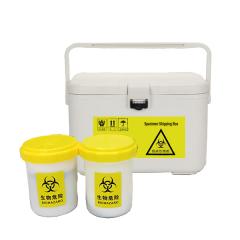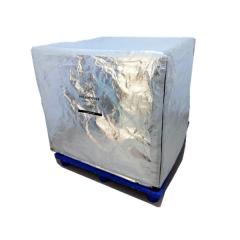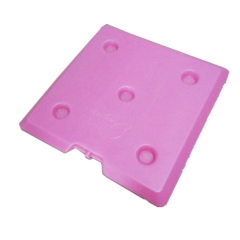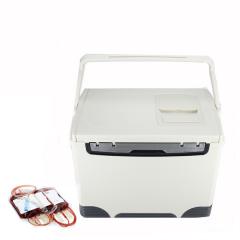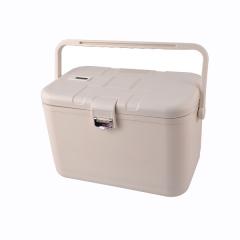The three major advantages of VIP panels in providing ample space for replacing traditional insulation materials
Thermal insulation materials refer to materials or composite materials used for thermal equipment or building enclosures, with impedance heat transfer. According to their insulation performance, they can be divided into two categories: conventional insulation materials and new insulation materials:
1) Conventional thermal insulation materials: they can be divided into three categories: inorganic thermal insulation materials, organic thermal insulation materials and metal thermal insulation materials. Inorganic materials include rock wool, mineral wool, glass wool, aluminum silicate fiber and related products. Organic materials mainly include polyurethane (PU), polystyrene (PS), phenolic resin foam and other foam plastics. Metal materials mainly include aluminum foil and tin foil.
2) New insulation materials: usually composite materials, can be divided into vacuum insulation panels, nanopore insulation materials, radiation insulation materials, etc. The insulation performance of new insulation materials is significantly superior to conventional insulation materials, and they are usually used in some high-end energy-saving products or fields with strict temperature control requirements.
Compared with other new insulation materials, due to the significant differences in performance characteristics and applicable fields between new insulation materials such as nanopore insulation materials and radiation insulation materials and vacuum insulation boards, vacuum insulation boards have significant comparative advantages in current usage scenarios such as refrigerators and freezers. Compared with traditional insulation materials, vacuum insulation panels have excellent insulation performance, space saving, environmental protection, and recyclability.
1. The thermal insulation performance is good, meeting the requirements of high efficiency and energy saving: the thermal conductivity of vacuum insulation board is generally lower than 3.5mW/(m · K), while the thermal conductivity of polyurethane foam is between 20-30mW/(m · K), and the thermal insulation performance of vacuum insulation board is 6 times or even higher than the latter. Vacuum insulation board, with its excellent insulation performance, is the most cost-effective technical means for refrigerators and other household appliances to further improve energy efficiency and reduce energy consumption (other energy-saving measures have limited space to play). Generally, refrigerators using vacuum insulation board as insulation material can save 10% -30% energy, with significant energy-saving effects.
Subsequent catalysis mainly relies on the formulation and implementation of national low-carbon and energy-saving policies and industry standards. The policy promotion has shown a characteristic of "leading overseas and following domestically". Due to the increasingly tight energy supply, coupled with a relatively strong awareness of energy conservation and consumption capacity, some regions abroad have taken the lead in promoting energy conservation and emission reduction in industries such as home appliances.
Among them, Japan was the first to promote the application of VIP boards due to the energy crisis caused by the 2011 Fukushima nuclear leak, and the penetration rate has now reached over 70%; In addition, the European Commission has officially implemented a new energy efficiency labeling scheme for household refrigerators and freezers since April 2021, stipulating that the new energy efficiency labeling level is only A to G (A represents the highest energy efficiency level, G is the lowest level), and the original highest level product (A+++) can only reach the new energy efficiency level D, or very few products can reach the energy efficiency level C. At the same time, G-level refrigerators and freezers will be forcibly phased out from September 1, 2023; Considering the domestic market, on the one hand, given that China is a major producer of refrigerators worldwide, with over 60% of refrigerators exported each year, the tightening of energy efficiency policies abroad will force domestic refrigerator manufacturing enterprises engaged in export business to increase the use of efficient and energy-saving materials such as VIP boards to meet the import standards of various countries. On the other hand, the overall tone of energy conservation and emission reduction in China has been set, It is only a matter of time before we expect the energy efficiency standards for the use of new insulation materials such as VIP panels to be introduced.
2. Environmentally friendly, recyclable core materials: Among the main foaming agents used in the production of rigid polyurethane foam, hydrochlorofluorocarbons (HCFCs), which were widely used in the early stage, can destroy the ozone layer. In recent years, HFCs, as substitutes, have been proved to produce powerful greenhouse gases, with a thermal effect thousands of times that of carbon dioxide, and have been officially listed in the list of restricted use by the Kigali Amendment to the Montreal Protocol, And it has set a timetable and reduction amount for countries to reduce HFC substances, and China officially accepted the amendment in April 2021, which came into effect on September 15, 2021. From the current development of alternative technologies, new foaming agents such as HFOs have high costs and unstable processes and performance. As thermosetting organic materials, the disposal of refrigerators using polyurethane also faces some environmental challenges. The production and application of vacuum insulation panels do not require the use of substances that deplete the ozone layer, nor do they generate greenhouse gas substances. In addition, the core material of vacuum insulation panels can be recycled, which has green and environmentally friendly properties.
3. Saving space and improving effective usage area: Vacuum insulation panels have excellent insulation performance, as well as advantages such as thin thickness, small volume, and light weight. When achieving the same insulation effect, the thickness used is only one tenth of that of traditional materials, which can save a lot of space and become one of the key technical means for expanding the volume ratio of household appliances such as refrigerators.

 русский
русский  English
English français
français italiano
italiano español
español português
português العربية
العربية 日本語
日本語 한국의
한국의 magyar
magyar





